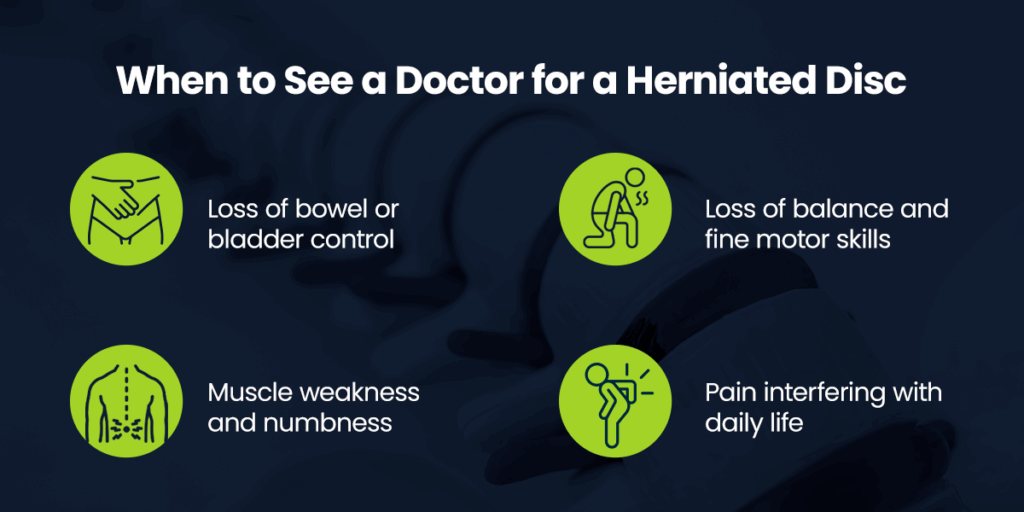If you have pain, weakness or numbness in your arms or legs, you might be experiencing a herniated disc. The common spinal disorder can occur from natural aging, a congenital condition, acute injury or spinal degeneration. While some can be healed by rest, others warrant a trip to the doctor to prevent severe or even permanent complications. Learn the causes and symptoms of herniated discs and when to seek treatment.
Herniated discs occur when part or all of a disc is forced through a weak area of the spine due to a problem with the soft, rubber disc between the spinal bones. The rupture puts pressure on the spinal cord or nearby nerves — typically in the lower back and the neck, resulting in pain, numbness or weakness.
While some herniated discs respond well to conservative treatments like over-the-counter pain medications and gentle exercises, some symptoms warrant a trip to the doctor. Here’s how to know if you have a herniated disc and treatment options that may bring relief.
Herniated discs typically occur with age. Our discs degenerate as we get older, and the ligaments around them weaken. The older you are, the more likely a minor injury is to cause a herniated disc. Additionally, herniated discs can occur from injuries and genetics. If many people in your family have experienced the condition, you might be genetically predisposed to get one as well.
Symptoms can vary depending on the injury’s severity and the disc’s location. They might include:
You might also experience numbness or tingling in the affected area that radiates through nearby limbs or weakened muscles near the source of pain. Discomfort from a herniated disc typically worsens when you’re active and lessens when you’re resting.
Depending on the person, a herniated disc may take two weeks to six months to heal. In severe cases, the pain might not dissipate without surgical intervention. Herniated disc treatment options include:

Some herniated disc symptoms can signify serious complications that warrant medical attention. Surgery is likely necessary for a herniated disc if your symptoms include:
Additionally, you should see a doctor if your symptoms worsen or do not get better after four to six weeks. The sooner you see a professional, the more likely your treatments will be successful. Waiting too long can also result in long-term nerve damage that may not respond to treatments.
Knowing who to see for a herniated disc can be challenging, as many types of doctors and treatment options are available. Note that you can seek specialists depending on how you were injured. For instance, some orthopedic specialists specialize in car accident injuries like herniated discs — ensuring you get the targeted care you need.
At Complete Care, we offer comprehensive care for orthopedic or spine injuries due to car accidents, including:
A herniated disc can be debilitating, but treatment is available to help you return to your daily routine. At Complete Care, our board-certified neurosurgeons and orthopedic doctors, chiropractic physicians and chiropractic neurologists can support you — from diagnosis to rehabilitation with pain management.
You’ll have a committed case manager to help guide you through treatments, and you can go to them with questions or concerns anytime to make informed medical decisions. Consider our testimonials to see the difference our treatments can make in your life.
Herniated discs can cause lasting pain, weakness, and limited mobility if left untreated. At Complete Care, our Spine and Orthopedics team provides expert evaluations and personalized, minimally invasive treatment options to help you recover safely and fully.
The information provided on this website does not, and is not intended to, constitute legal advice; instead, all information, content, and materials available on this site are for general informational purposes only. Information on this website may not constitute the most up-to-date legal or other information. This website contains links to other third-party websites. Such links are only for the convenience of the reader, user or browser.